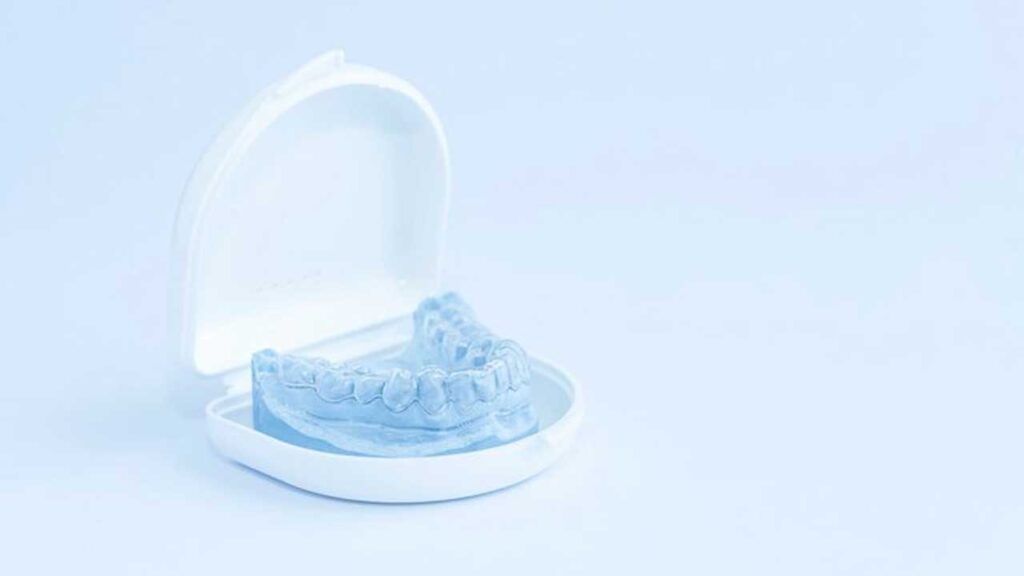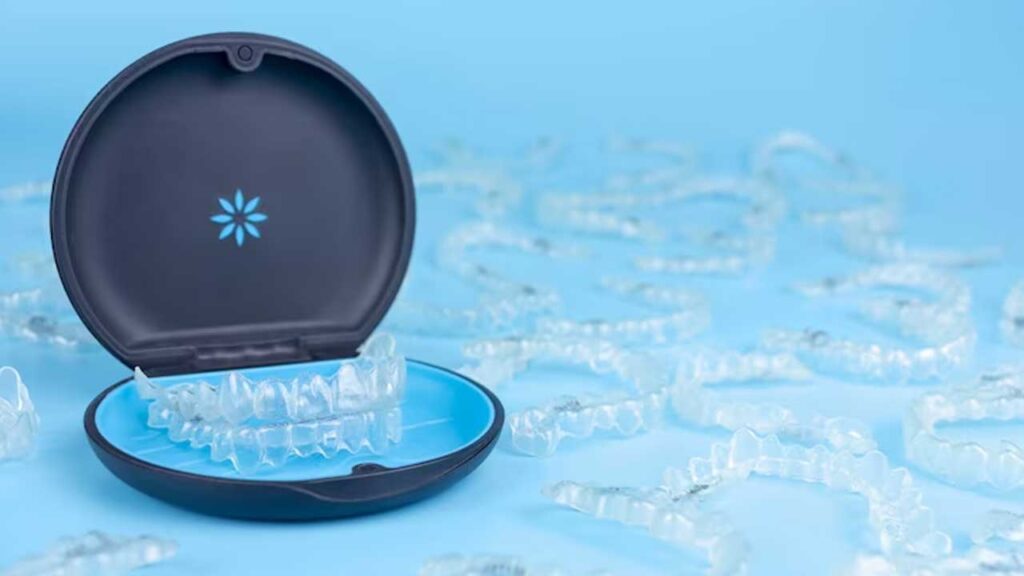Dental retainers are devices that are used to maintain the alignment and position of the teeth after orthodontic treatment, such as braces or Invisalign. Dental retainers can be either fixed or removable, depending on the type and severity of the malocclusion and the preference of the patient and the dentist. Fixed retainers are permanently attached to the back of the teeth, while removable retainers can be taken out for cleaning and eating.
Removable retainers are usually made of clear plastic or metal wire that fit over the teeth. They need to be worn regularly and consistently, usually at night or for a few hours during the day, to prevent the teeth from shifting back to their original positions. Removable retainers also need to be cleaned and stored properly, to prevent them from getting damaged, lost, or contaminated.

This is where dental retainer cases come in handy. Dental retainer cases are containers that are used to store and protect removable retainers when they are not in use. Dental retainer cases can help extend the lifespan and effectiveness of removable retainers by providing several benefits, such as:
Preventing physical damage.
Dental retainer cases can prevent physical damage to removable retainers by protecting them from external forces or impacts that can cause them to break, crack, bend, or warp. For example, dental retainer cases can prevent removable retainers from getting crushed or stepped on when they are left on a table, a bed, or a floor. Dental retainer cases can also prevent removable retainers from getting exposed to extreme temperatures or sunlight that can cause them to melt or discolor.
Preventing loss or misplacement.
Dental retainer cases can prevent loss or misplacement of removable retainers by providing a secure and visible place to store them when they are not in use. For example, dental retainer cases can prevent removable retainers from getting thrown away or forgotten when they are wrapped in a napkin or a tissue. Dental retainer cases can also prevent removable retainers from getting mixed up or confused with other items when they are placed in a pocket, a purse, or a backpack.
Preventing contamination or infection.
Dental retainer cases can prevent contamination or infection of removable retainers by keeping them away from germs, bacteria, or fungi that can grow on them or transfer to them from other sources. For example, dental retainer cases can prevent removable retainers from getting dirty or stained when they are exposed to food, drinks, saliva, blood, or other oral fluids. Dental retainer cases can also prevent removable retainers from getting infected or causing infections when they come into contact with unclean surfaces, hands, mouths, or pets.
These are some of the roles of dental retainer cases in protecting your retainer and ensuring its optimal function and hygiene.
How to Choose and Use Dental Retainer Cases Properly and Effectively?
Choosing and using dental retainer cases properly and effectively is not a difficult or complicated task, but it requires some attention and care. You need to follow some tips and guidelines when choosing and using dental retainer cases, such as:
Choose the right size and shape of dental retainer case.
You should choose a dental retainer case that fits your removable retainer well, without being too tight or too loose. A tight dental retainer case can cause pressure or distortion on your removable retainer, while a loose dental retainer case can cause movement or displacement of your removable retainer. You should also choose a dental retainer case that has a simple and convenient shape, without being too bulky or too small. A bulky dental retainer case can take up too much space or weight in your pocket, purse, or backpack, while a small dental retainer case can be easily lost or misplaced.
Choose the right material and quality of dental retainer case.
You should choose a dental retainer case that is made of durable and hygienic material, such as plastic, metal, or silicone. A durable dental retainer case can withstand wear and tear, impact, or temperature changes, while a hygienic dental retainer case can resist germs, bacteria, or fungi growth. You should also choose a dental retainer case that has a good quality, without being too cheap or too expensive. A cheap dental retainer case can break or crack easily, while an expensive dental retainer case can be unnecessary or wasteful.
Choose the right color and design of dental retainer case.
You should choose a dental retainer case that has a color and design that suit your preference and personality, without being too flashy or too dull. A flashy dental retainer case can attract unwanted attention or theft, while a dull dental retainer case can be boring or depressing. You should also choose a dental retainer case that has a clear and visible label or identification, such as your name, phone number, or address. This can help you find your dental retainer case easily if you lose or misplace it, or help others return it to you if they find it.
Clean and store your dental retainer case regularly.
You should clean and store your dental retainer case regularly to keep it in good condition and hygiene. You should clean your dental retainer case at least once a week with mild soap and water, and dry it thoroughly with a clean cloth or paper towel. You should also disinfect your dental retainer case occasionally with alcohol or bleach solution, and rinse it well with water. You should store your dental retainer case in a cool and dry place, away from direct sunlight or heat sources. You should also replace your dental retainer case every six months or whenever it shows signs of damage or wear.
By following these tips and guidelines, you can choose and use dental retainer cases properly and effectively and protect your removable retainers from damage, loss, or contamination.
What Are the Benefits and Risks of Dental Retainer Cases?
Dental retainer cases are containers that are used to store and protect removable retainers when they are not in use. Dental retainer cases can help extend the lifespan and effectiveness of removable retainers by providing several benefits, such as:
- Preventing physical damage. Dental retainer cases can prevent physical damage to removable retainers by protecting them from external forces or impacts that can cause them to break, crack, bend, or warp. For example, dental retainer cases can prevent removable retainers from getting crushed or stepped on when they are left on a table, a bed, or a floor. Dental retainer cases can also prevent removable retainers from getting exposed to extreme temperatures or sunlight that can cause them to melt or discolor.
- Preventing loss or misplacement. Dental retainer cases can prevent loss or misplacement of removable retainers by providing a secure and visible place to store them when they are not in use. For example, dental retainer cases can prevent removable retainers from getting thrown away or forgotten when they are wrapped in a napkin or a tissue. Dental retainer cases can also prevent removable retainers from getting mixed up or confused with other items when they are placed in a pocket, a purse, or a backpack.
- Preventing contamination or infection. Dental retainer cases can prevent contamination or infection of removable retainers by keeping them away from germs, bacteria, or fungi that can grow on them or transfer to them from other sources. For example, dental retainer cases can prevent removable retainers from getting dirty or stained when they are exposed to food, drinks, saliva, blood, or other oral fluids. Dental retainer cases can also prevent removable retainers from getting infected or causing infections when they come into contact with unclean surfaces, hands, mouths, or pets.
However, dental retainer cases are not foolproof or risk-free devices. They also have some drawbacks and limitations that can affect their function and performance. Some of these drawbacks and limitations are:
- Requiring maintenance and care. Dental retainer cases require maintenance and care to keep them in good condition and hygiene. They need to be cleaned and disinfected regularly with mild soap and water, alcohol or bleach solution, and dried thoroughly with a clean cloth or paper towel. They also need to be replaced every six months or whenever they show signs of damage or wear.
- Not replacing proper cleaning and storage of removable retainers. Dental retainer cases are not substitutes for proper cleaning and storage of removable retainers. They are only meant to protect removable retainers when they are not in use. Removable retainers still need to be cleaned and stored properly when they are in use. They need to be brushed and rinsed with water after each use, soaked in a denture cleaner solution once a day, and kept in a cool and dry place away from direct sunlight or heat sources.
- Not guaranteeing the fit and function of removable retainers. Dental retainer cases are not guarantees for the fit and function of removable retainers. They can only help preserve the shape and condition of removable retainers as much as possible. Removable retainers still need to be checked and adjusted by a dentist regularly to ensure their optimal fit and function. Removable retainers may still lose their fit and function over time due to various factors, such as growth and development, aging and wear, dental treatments and interventions, trauma and injury, habits and behaviors, or diseases and conditions.
These are some of the benefits and risks of dental retainer cases that you need to be aware of before using them.
Dental retainers are devices that are used to maintain the alignment and position of the teeth after orthodontic treatment. Removable retainers are usually made of clear plastic or metal wire that fit over the teeth. They need to be worn regularly and consistently, usually at night or for a few hours during the day, to prevent the teeth from shifting back to their original positions. Removable retainers also need to be cleaned and stored properly, to prevent them from getting damaged, lost, or contaminated.
Dental retainer cases are containers that are used to store and protect removable retainers when they are not in use. Dental retainer cases can help extend the lifespan and effectiveness of removable retainers by providing several benefits, such as:
- Preventing physical damage
- Preventing loss or misplacement
- Preventing contamination or infection
However, dental retainer cases are not foolproof or risk-free devices. They also have some drawbacks and limitations, such as:
- Requiring maintenance and care
- Not replacing proper cleaning and storage of removable retainers
- Not guaranteeing the fit and function of removable retainers
By reading this article, you learned about the role of dental retainer cases in protecting your retainer and ensuring its optimal function and hygiene.
